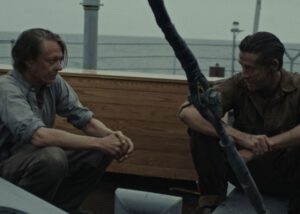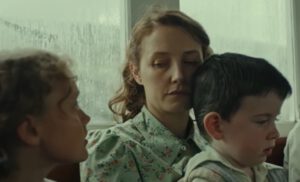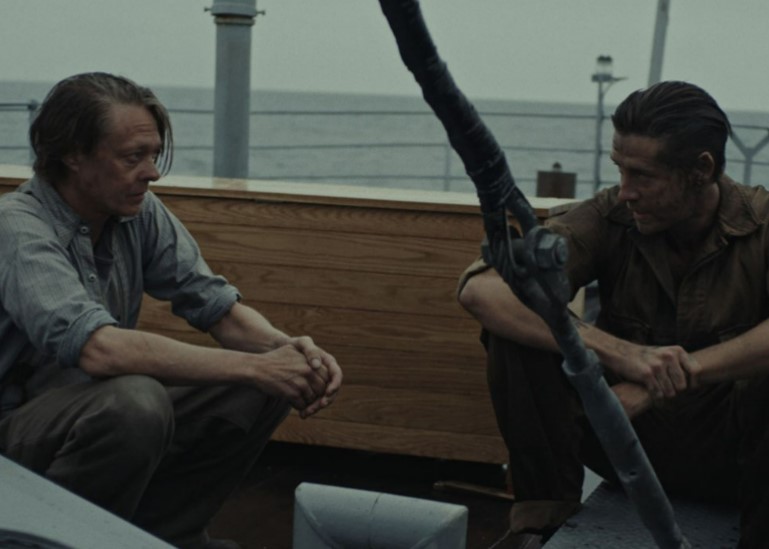Movie Info
Movie Info
- Director
- Gunnar Vikene
- Run Time
- 2 hours and 30 minutes
- Rating
- TV-MA
VP Content Ratings
- Violence
- 3/10
- Language
- 2/10
- Sex & Nudity
- 1/10
- Star Rating
Relevant Quotes
Two are better than one because they have a good reward for their toil. For if they fall, one will lift up the other, but woe to one who is alone and falls and does not have another to help.
A friend loves at all times, and kinsfolk are born to share adversity.

Norwegian director/ writer Gunnar Vikene has given us a grim visual parable about an overlooked group of World War Two combatants, Norwegian merchant sailors drafted into the war effort when Germany invaded their country. Although a war story, it is even more a tale of friendship, long-time suffering, and sacrifice. Before Netflix made it into a three-part miniseries it was a 2 ½ hour feature film (original title: Krigsseileren), Norway’s entry for the 2023 Oscars. It had the misfortune of running against the German WW One film, All Quiet on the Western Front, which won the Best Foreign Language Film.
Vikene’s film opens in 1948 on the other side of the world, in Singapore, where Sigbjørn Kvalen (Pål Sverre Hagen) has found Alfred Garnes (Kristoffer Joner), once his friend in Norway and shipmate on the high seas. The latter is almost dead from drug use and not at all happy to see his old friend. We will later see just how devoted a friend Sigbjørn is as he nurses back to health the wasted away Alfred.
Then it’s back to Norway in late 1939. Germany has taken over Poland, but Norway is neutral. The two men are being paid for one day’s work on the docks of Bergen. Alfred has been a cook, but such jobs are no longer available, and those on the docks also few and far in between. No longer needed at the shipyard, Sigbjørn suggests they join the crew of a merchant ship that would take them to New York and other ports. He is single, so being gone for 18 months is no problem for him. Alfred, however, is married to Cecilia (Ine Marie Wilmann), and they have three children, Magdeli, William, and Olav. Cecelia understands their need for separation, but middle school-aged Magdeli (Henrikke Lund Olsen) balks at his plan—she is so convinced that he will never return that she becomes hysterical. Cecilia makes Sigbjørn promise that he will watch over and bring back her husband. Alfred promises Magdeli that he will write them regularly.
Nevertheless, her father and his best buddy set sail. A little later the Nazis invade and occupy Norway, the government in exile declaring that all merchant marine men must remain with their ships that are now providing the vital lifeline of goods and arms to the besieged British. The two friends do not like the order, but they dedicate their service to the children of Great Britain. Soon they come upon the devastation wreaked by the German submarines. They spot a group of survivors from a torpedoed ship. They frantically toss out ropes to the survivors, but the ship is moving so fast that most of the people cannot grab ahold of the line. The friends ask that the ship stop but the captain, fearful of becoming another target for the U-boat lurking nearby, refuses. Thus, they manage to rescue just a handful of the shipwrecked sailors. Among them is the teenaged Aksel (Leon Tobias Slettbakk), whom the two friends take under their wing. Later, while sheltering from an air raid they will discover that he has just reached the legal age of service, 16.
Alfred is unable to communicate with his family because of the war, but he continues to write letters to his wife and children in his notebook, as he had promised them. Cut off from their families back home, the two men form a new one consisting of Aksel and Hanna (Alexandra Gjerpen), the lone young female sailor, plus a few others.

Back in Bergen Cecilia struggles to put food on the table for her family. They often pass German soldiers in the streets but seem to have no direct intercourse with any of them. Not boding well for the town is the fact that its harbor has been turned into a submarine base for the Nazis.
As the years of separation past, we are reminded several times of the number of Norwegian vessels (hundreds) that the Nazi U-boats sink. At last, it becomes the fate of the ship two the friends are on. Everyone is scrambling up ladders and through corridors to be able to jump into the water before the ship sinks. The two friends manage to climb aboard a large piece of flotsam while bodies of crewmates float by. One of these is that of young Hanna. They are able to bring aboard Aksel, but he is missing a foot. As he screams in pain and panic, the U-boat draws aside the raft, the German captain looking down at them from the conning tower.
It is this which becomes a moment of grace, the captain sending the hip’s doctor down to examine the lad. Checking him over, the doctor looks back grim faced at the captain and shaking his head negatively. The officer gives him permission to leave almost half of his kit’s morphine. As the medic reboards the sub, the captain explains to the derelicts that he cannot take any of them aboard and leaves. All the while poor Aksel is screaming aloud, not able to hear or understand the assurances of Sigbjørn and Alfred that h will be alright. Knowing the outcome of an overdose, they inject all of the morphine capsules into the dying boy. Hastening the peace that only death can now bring him. During the following harrowing days Sigbjørn will save his friend’s life when a crazed crew member, believing that a devil is in the unconscious man, tries to kill him.
In Bergen Cecilia receives the government telegram informing her of the sinking of her husband’s ship. He is presumed dead, his name not on the list of survivors that were picked up. Cecilia is saddened, but Magdeli is devastated, well aware that she had predicted this outcome years before. The Allies mount an aerial attack on the submarine base. Their bombs smash into the town as well, killing dozens of adults and children. Cecilia rushes to the school, finding it smashed into pieces. The horror of this sequence is as great as that of the shipwrecked sailors. As lifeless bodies are lifted out of the rubble, accompanied by the screams and shrieks of the mothers, Cecilia at last comes across her daughter, battered but alive.
Sigbjørn and Alfred are rescued but are told that Cecilia and the children perished in the bombing attack on the town—by their allies no less. As devastated as his daughter, Alfred sees no reason to return home. He drifts apart from his friend, signing onto various ships that take him around the world—until the drugs that he uses to ease his psychic pain leads to the opium din in Singapore. Before Sigbjørn catches up with his friend, he has returned to Bergen, informed Cecelia and her children that Alfred is alive, but that they have lost contact with each other. He finds work, stays close to the family and even starts to fall in love with the mother as he fills in the hole in the family left by Alfred’s absence. Then he receives a letter that Alfred has been found in Singapore. He does not tell Cecilia at first, and we see that night her nestling her head against his shoulder in bed while he lies awake staring up at the ceiling. We can tell in a headshot of the man that he is wrestling with the news. At work where Cecilia’s son William also is employed, the young man sees Sigbjørn speaking to their boss. Back home the son tells his mother, “He has left.” Right after that Sigbjørn shows her the letter and informs her that he will go to get Alfred.
I wish that his sacrificial love brings the reunited family to a happy ending, but director Gunnar Vikene as writer is too honest to discount the horrific effects war has on its participants. The last part of the film, though difficult to watch, is very memorable, Alfred futilely tries to fit back into his family’s life. Cecilia at times has to protect one of the boys from Alfred’s fury. He is a haunted, hollow man, not at all the Alfred they all loved before the War tore him from them.
Sailor at War is not a film you should see if you cannot lay aside he desire for facile happy endings. This is a film drawing you in to the sufferings of its subjects. You become immersed in the terrible consequences that war produces for both civilians and the military. Sigbjørn and Alfred did not fight with guns but with their service in the merchant marine transporting valuable goods that enabled Great Britain to stand alone against the Nazi onslaught of those early years of the War. And Gunnar Vikene wants the world to recognize their service before a world ignorant of their contribution to the defeat of the Nazis. Title cards at the end report that “30,000 Norwegians sailed for he allies in the Norwegian fleet, that half of the Norwegian merchant ships were lost, one out of nine seamen died,” and “Many more were hurt and traumatized.” A Nobel Peace Prize winner is quoted “Without the Norwegian Merchant Fleet, England and The Allies would have lost.”
Not only were these sailors forgotten, many were unable to receive the veterans benefits after the war because they did not wear uniforms. And when they were rewarded years later with medals for their service, they had to pay for them themselves!
This review is in the Sept. issue of VP along with a set of questions for reflection and/or discussion. If you have found reviews on this site helpful, please consider purchasing a subscription or individual issue in The Store.

